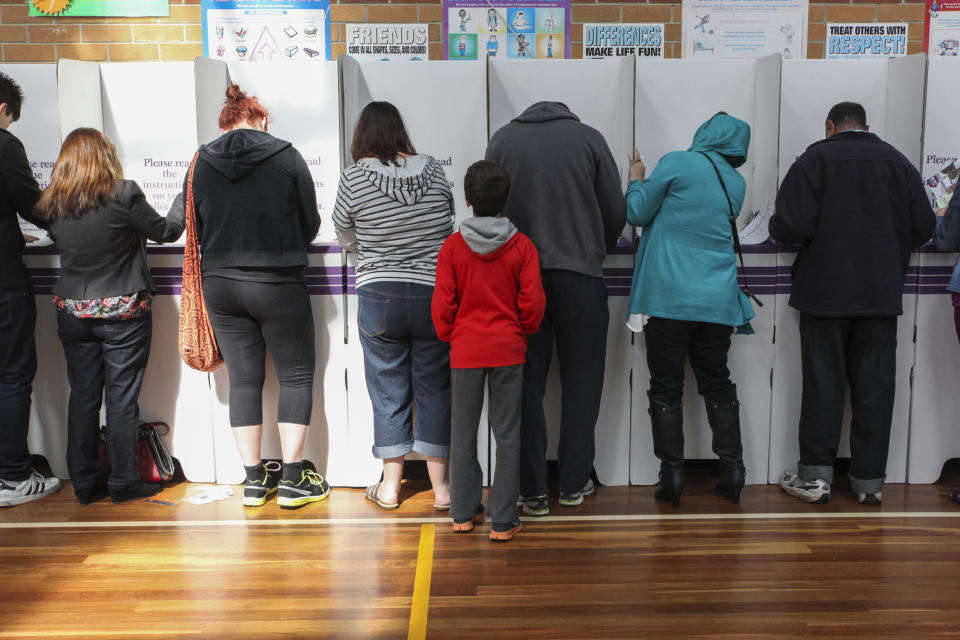Who will put more money in your pocket: Labor or the Coalition?

It’s not even winter, but like many Australians, I’ve already had a nasty cold this year.
Half the office has fallen ill in recent weeks.
Why?
Because professionals, rightly or wrongly, feel compelled to turn up to work – even if they’re quite ill. Of course viruses then spread and make other people sick.
Why are we all so keen to work?
Well despite the nation having a relatively low unemployment rate, we’re all acutely aware of how valuable it is to have a job.
With the rising cost of living, and high levels of personal debt, it’s never been so important to have a reliable income stream to help pay the rent or mortgage.
Now that house price declines are moving into the double digits, borrowers are also facing the prospect of “negative equity’ – where the value of their home falls below the value of their mortgage.
Having income or cash to help make up the difference is therefore vital for keeping a roof over your head.
All of this helps to explain why, as election campaigning shifts up a gear, both Scott Morrison and Bill Shorten are offering to be the one safe pair hands that will help households navigate the next few years.
But the line between the two parties is quite stark when it comes to remedying all of this.
The Coalition says it will put more money into your pocket by lowering taxes, while Labor says it wants to raise taxes and use the money to provide better health and education.
So who’s got the better plan? And how will it affect your hip pocket?
Related article: Here’s what could decide Australia’s vote
Related article: Political ads burn $46 million hole in taxpayers’ pocket
Related article: Labor to match Liberals on tax cuts, will boost Medicare
More money under a Coalition government?
Not surprisingly, the government has done some number crunching to help us out.
At a basic level, the Treasurer claims, based on Liberal Party Analysis, that people on more than $40,000 will be better off if Scott Morrison become prime minister.
By 2024-25, says the government, the cash gains under the Coalition compared with Labor will be substantial.
Assuming an $80,000 income, the tax gain under the government compared with Labor is $875 yearly.
At $100,000 it is $2125 per annum.
And at $140,000 it reaches $5705 per annum.
But, is this fair?
Well, by the time the tax reform has taken shape, the well-healed will continue to pay the overwhelming share of taxation, with the top 1 per cent of taxpayers paying 17 per cent of total tax, and the top 20 per cent of taxpayers paying 60 per cent of total tax.
Labor also makes a strong case
Would-be Treasurer Chris Bowen says Labor has a “comprehensive policy agenda”.
Labor has already said it will match the Coalition’s $1,080 tax offset from the 1 July for workers earning under $130,000.
But for workers earning under $40,000 – largely women working part-time – Labor says it’s offering a better deal.
Aside from clearly putting more money in the pockets of “workers”, Labor also believes Australians want more funds spent on services, notably health and education, as opposed to tax cuts.
So… it’s promising to make life better beyond just handing out more money.
The issue no one wants to touch
The distinction is clear.
There’s higher taxes, lower taxes, and plans to spend on essential services – all pretty bread-and-butter election stuff.
Policy think tank the Grattan Institute, however, wants to highlight a work/life balance issue that no one is talking about.
Its latest research claims thousand of hard-working families are being squeezed, and there’s little in what’s being offered up by ether major parties to help them out.
CEO John Daley explains:
“People who are working 3 days a week, and they’ve got kids in child care, often they face effective marginal tax rates of 90 or 95 cents in the dollar.”
“In other words, for every extra dollar they earn, they only get to keep about 5 cents.”
“They give some away in tax, they give some away because they get less in the way of welfare benefits [the more they work].”
“It means that for many people in that situation, it’s literally not worth working an extra hour.”
This is a big struggle for many young families.
The problem with campaigning
The problem with an election campaign is that you have to simplify your message to a very basic line – otherwise how can you communicate, collectively, to over 10 million people?
However folks’ financial problems aren’t simple. In fact they have the potential to be quite complex.
At one end of the scale you have people turning up to work who shouldn’t, because they’re afraid someone else will take their job, and at the other end, you’ve got people actively avoiding work so they’re not financially worse off.
Meanwhile both Morrison and Shorten are asking you to trust them to make the tough decisions to make everyone better off.
There’s obviously a bit at stake in this Federal Election.
@DaveTaylorNews
Make your money work with Yahoo Finance’s daily newsletter. Sign up here and stay on top of the latest money, property and tech news.

 Yahoo Finance
Yahoo Finance 